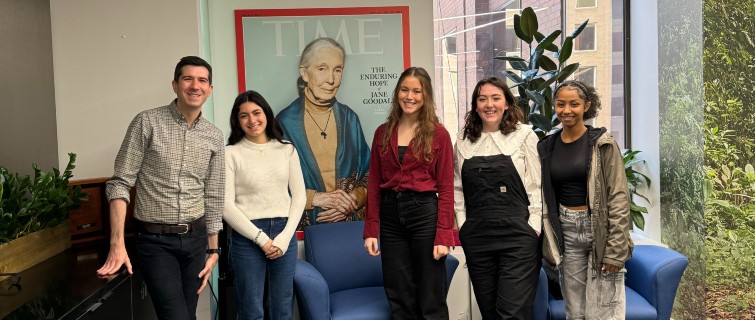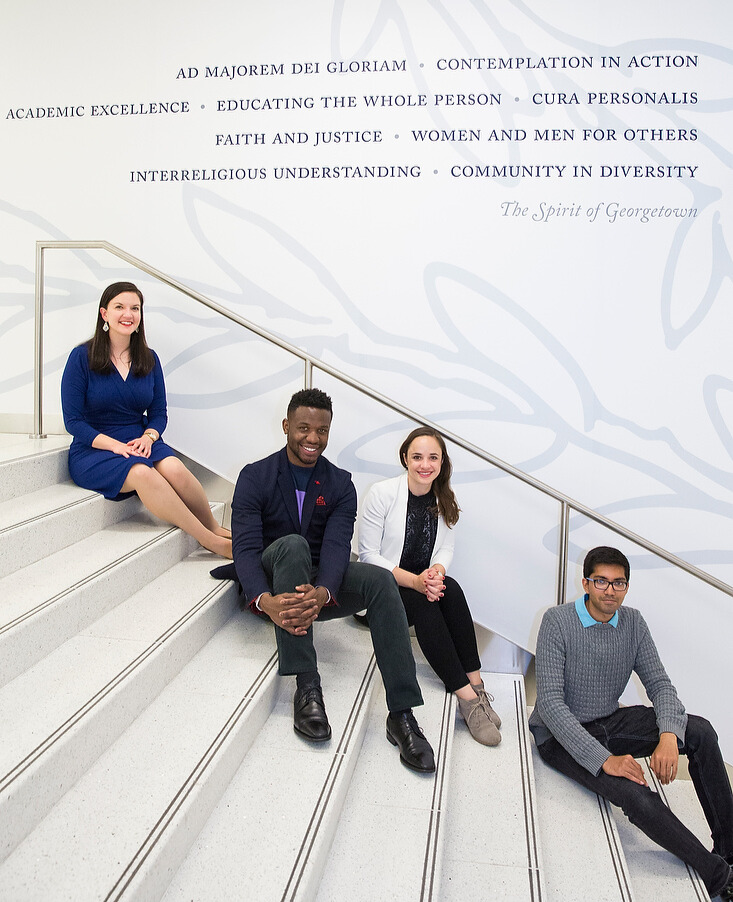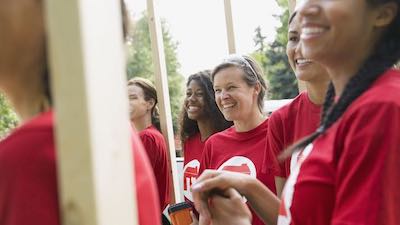
King Street in Old Town Alexandria is a charming colonial-era tourist way with restaurants, quaint taverns and shops; and, if you don’t look too hard, you might not notice the few homeless people who hang out there and emerge, every so often, from its shadows.
Jane Hess Collins, who lives nearby, did notice, night after night, and wondered what their stories were; not just how they came to live on the street, but what they had been before. What kind of jobs did they have? What dreams did they hold that were never fulfilled?
Others more fortunate have multiple ways of telling their story, “but they may not have had that opportunity,” Collins says. “Nobody’s listening to them. I’m going to give them a chance to be heard.”
That was the impetus for Heard, a nonprofit Collins founded in 2017 that brings free classes to people in subjects like creative writing, public speaking, improvisation, and the visual arts. It has been a remarkable success for Collins, a retired Air Force Colonel, the 13 local artists who teach there, the governments and nonprofits that refer people to the program, and the students themselves – some in shelters, some living on their own, some in jail—who have taken nearly 1,000 classes since 2017.
But it never would have happened if not for her connection to Georgetown University’s Center for Social Impact Communication (CSIC) where she studied social impact consulting while serving other local nonprofits through its pro-bono partnerships in the community.
“Had I not gone through the Georgetown program, I wouldn’t have the skill set,” Collins says. “I wouldn’t have the background. It would have been too overwhelming for me to even know where to start.”
A Time To Celebrate

On December 4, CSIC marked its 15-year anniversary with a film screening, panel discussion, and reception at Georgetown’s School of Continuing Studies (SCS). There was much to celebrate. Over those years, CSIC has formed partnerships with hundreds of local nonprofits and donated $20 million in services from students sharing the social impact skills in topics like storytelling and consulting they acquired through the Center’s certificate and class offerings.
CSIC was started at a time when a critical mass of professional learners were looking at the world around them and asking how they could use their careers to advance justice, says John Trybus, Ph.D., an Assistant Professor of the Practice who leads CSIC as its Director. “But it was also a way to channel social impact for the whole of SCS. It was really a good personification of the school valuing social impact and our Jesuit values.”
The panelists included: George L. Askew, MD, president and CEO of the Meyer Foundation; Mike Curtin, CEO of DC Central Kitchen; and Anna Rathmann, Executive Director of the Jane Goodall Institute, where Trybus served as an advisor to the environmental icon Dr. Goodall before coming to Georgetown. Each panelist was purposefully chosen as leaders of organizations that have partnered with CSIC.
Goodall’s work, and her philosophy, influence Trybus’ teaching even today.
“One of the classes I love to teach is The Jane Goodall Rules: Activating Our Reasons for Hope where students not only study her four reasons for hope (the amazing human intellect, the resilience of nature, power of young people, and the indomitable human spirit) but also apply Jane’s philosophy of service to their own unique life paths through action promises,” Trybus says on his LinkedIn page.
While the mood at the anniversary event was generally hopeful, the inclusion of the documentary film “UnCharitable” was a sobering reminder of the prejudices many charities face when they try to expand (as businesses regularly do) by investing in things like infrastructure, marketing, and competitive salaries. Based on the 2022 book by Dan Pallotta, the film argues that the public and news media don’t understand that nonprofits need to grow just like businesses do if they can ever hope to meet the colossal demand for their services.
And that kind of growth requires stronger outreach and communication.
“I think one of the themes throughout and one of the five areas he says we’re underinvesting in is storytelling, and that is such a big role in how we can actually grow these movements,” says Kathy Swayze, President and Creative Director of Impact, Inc., a fundraising agency in Washington, D.C.
CSIC has been doing its part since its inception, but especially since 2018 when it introduced its hugely popular Certificate in Social Impact Storytelling. In the past five years, more than 200 professional learners from around the world have earned certificates in what Trybus calls CSIC’s “marquee program.” The center also offers professional certificates in Social Impact Branding, Social Impact Consulting, and Social Impact Partnerships. And it conducts research in areas like the evolution of philanthropy, narrative change, and nonprofit innovation.
Making an Impact
There were mushrooms growing inside the wall. That was what was making his 10-year-old sick.
The man’s whole family had been feeling ill, but his daughter was suffering the most, developing headaches soon after she entered their public housing unit in Southwest, Washington, D.C. So, one day, frustrated and searching for answers, he pried open part of the wall with a hammer and saw the mold growing.
One family’s suffering, one family’s story. Hardly noteworthy in a city where more than one in 10 residents, the vast majority of them Black, are classified as “housing insecure,” and those who are able to find shelter in public housing must often deal with pests, long-deferred maintenance, overcrowding—and mold.
When housing advocate Rhonda Hamilton needs to talk to the District of Columbia Housing Authority and other agencies about what public housing residents are experiencing, she could cite statistics, studies, and reports—all of which have their uses, to be sure—or she could tell a simple story like the one above: about a father, concerned for his daughter, who finally took it upon himself to find out what was wrong.
She learned this in the Certificate in Social Impact Storytelling program at CSIC.
“I have to share what their experiences are,” says Hamilton, who wears “many hats” and devotes much of her time to her unpaid job of Advisory Neighborhood Commissioner. “So, I’m able to use storytelling to let people know, like, ‘This is what the resident is going through. This is how it feels, their lived experience.’”
The family was eventually able to move out, and the girl’s health improved.
Cary Umhau, Co-Founder of Breadcoin Foundation, has also worked with Trybus and the Center for many years.
“He had a group of students who ended up taking us on as a consulting client as a class project and created a marketing strategy—a communication visual strategy,” Umhau says.
Breadcoin is a nonprofit through which members donate money to buy tokens worth $2.50 each. Token users can redeem them at participating restaurants, grocery stores, and catering businesses. The goal is to provide dignity, sustenance, and “a seat at the table” to people who are hungry or food insecure.
Started in Washington, D.C., Breadcoin now has chapters in Baltimore; Harrisburg, Pa.; and Tampa, Fla. Umhau says that she has spoken several times to Trybus’ classes and that they have “gone out onto the streets together and led the students through some experiential learning around creating neighborhood connections care for people on the streets in a sensitive way.”
The Next 15 Years
These kinds of successes, large and small, have been replicated countless times over the past 15 years of CSIC’s existence. Now, as the Center looks to the future, it sees both opportunities and challenges.
The information explosion is having profound effects on our society and how we communicate with one another. On the downside, misinformation and extreme partisanship are on the rise. More people are angry, isolated, and depressed. Yet, on the flip side, there is hope, Trybus says, a sense that the same technology that can oppress us offers an unprecedented chance to solve problems we thought were too big to solve before.
There was a time, Trybus says, when few people knew what social impact was. Now, when students of all ages and backgrounds express interest in the field, he asks them what kind of social impact they want to go into, whether they want to work for a foundation, a nonprofit, a business, the government, or, like Collins, their own charitable startup.
“More people are making life commitments to social impact and social justice,” Trybus says. “They have a vision that they can make their communities better. But they need to know how to do that. Through our curriculum, community engagement initiatives and convenings, CSIC is here to support them”
